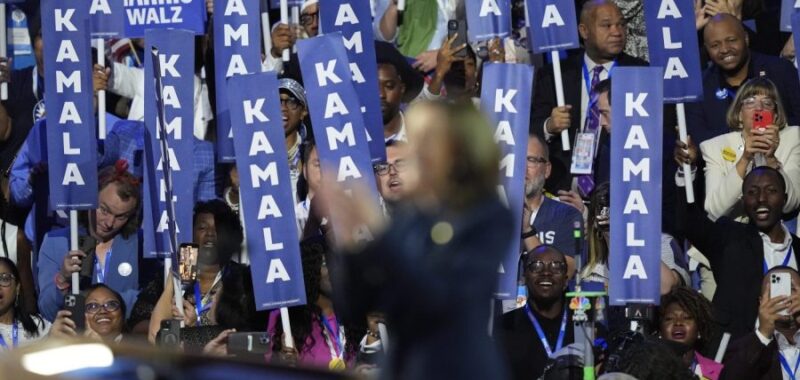
The first question in the vice presidential debate was about the Iranian missile attack on Israel, which took place earlier that day. In their answers, both Sen. JD Vance and Gov. Tim Walz consistently referred to the country of Iran as “Eye-ran,” despite that the moderator had just pronounced it “Ee-rahn.” The latter pronunciation is correct, much closer to what a Persian speaker would say.
With so much at stake in this election, and with American public attention on the Middle East likely to keep growing given the escalating conflict between Iran and Israel, do relatively minor mispronunciations matter?
Much ink has been spilled recently about “Kamala,” routinely mispronounced in various ways by Vance, former President Donald Trump and other Republican politicians. Americans named Kamala don’t all pronounce their name the same way, but the point is to listen. As actress Richa Moorjani, who plays a character named Kamala in the Netflix series “Never Have I Ever,” put it, “How people choose to say their own name is personal — and should be respected.”
How do we determine the correct pronunciation of a name? The answer is different in anthroponomy, the study of human names, and toponymy, the study of place names.
One cannot ask a country how it prefers to be pronounced. But the pronunciation of “Iran” is not a case of a place name as it is used within a country (an endonym) vs. a different pronunciation or word used when an endonym is difficult to pronounce for non-native speakers (an exonym), as in “x” for the Spanish “h” sound in “Mexico” or “Germany” for “Deutschland.”
“Ee-rahn” is no harder for English speakers to say than “Eye-ran.” That makes it a mispronunciation, and given the state of U.S.-Iran relations, often a willful one. The emotional impact of the particular sounds are debatable, but at least one critic has argued that “‘Eye-ran’ and ‘Eye-ranian’ sound contemptible, almost like a menacing threat, in stark contrast to the more placid and pleasant sounding ‘Eee-rahn.’”
The stakes in how American public figures talk about Iran are extremely high. The country has been in the news, and at the center of American foreign policy, for decades. “Iran” (rather than “Persia”) has been used since 1935, when Reza Shah Pahlavi requested that foreign diplomats refer to the country by its endonym. With “Iran” in use for nearly a century, there is no excuse for today’s politicians not to be fully aware of the correct pronunciation and careful to use it consistently.
Harris pronounces it “Ee-rahn,” as does Barack Obama. After a history of mostly using “Ee-ran” (from Jimmy Carter during the hostage crisis to Sen. John McCain’s infamous “Bomb, bomb, bomb Iran”), even George W. Bush pronounced it correctly in the “Axis of Evil” speech, which set the precedent for American demonization of Iran in the 21st century.
Beyond politics, the mispronunciation made news in 2022 when Tyler Adams, captain of the U.S. men’s national soccer team, was made to apologize for it during a World Cup news conference. Responding to an Iranian journalist, Adams reflected on the mispronunciation in light of loving his own country while being critical of its history of racism: “Like you just educated me now on the pronunciation of your country. So, yeah, it’s a process. I think as long as you see progress, that’s the most important thing.”
American foreign policy today is not characterized by good sportsmanship. Unlike Adams’s earnest ability to see his fellow athletes as human beings with complex relationships to their nation and culture, American politicians insisting on “Eye-ran” in the alarming context of escalating conflict in the Middle East should be seen as intentional xenophobia.
Vance’s demonization of Iran is unsurprising, given his running mate and his party’s explicitly xenophobic platform. But during the debate, Walz was likewise unable to come up with any specificity in relation to Iran as a country with citizens and a culture. He flailed as much on pronunciation — and even briefly confused the words “Iran” and “Israel” — as he did on the policy substance of the debate’s first question.
Mispronunciations are often accidental and mean no harm. But like these recent high-profile “Eye-rans,” the daily mispronunciation of “Kamala” has clearly formed an intentional pattern in this election. Recall the moment at the Democratic National Convention when actress Kerry Washington brought Harris’s grand-nieces on stage to make a cute performance of the correct pronunciation, concluding: “Confusion is understandable. Disrespect is not.”
Alongside a barrage of other offensive and nonsensical moments and monikers (“Comrade Kamala”; “Is she Indian? Or is she Black?”; “mentally impaired”), the range of mispronunciations of Harris’s first name produces an implicit sense of suspicion about the highest ranking woman of color in American history. This suspicion is created unconsciously when we are made to pause and question something so core to her identity as how to say her name. “Woman of color” equals “foreign” equals “suspicious,” the persistent mispronunciation implies.
Trump’s “Lying Kamala” epithet conveys even more untrustworthiness when “Kamala” is mispronounced. The same happens when we accept public perpetuations of “Eye-ran” — destabilizing the country’s name evokes a feeling that the country itself is an unclear, illegible place populated by dangerous, untrustworthy people.
But that mistrust runs in both directions, American and Iranian, and we must hold politicians to a higher standard if we are to avoid it. “Give your daughters difficult names,” the Somali-British poet Warsan Shire writes in her poem “the birth name” — “my name does not allow me to trust anyone who cannot pronounce it right.”
Marie Ostby is assistant professor of English and Global Islamic Studies at Connecticut College. Her book “Genres Without Borders: The Worlding of Persianate Forms” will be published in fall 2025.

